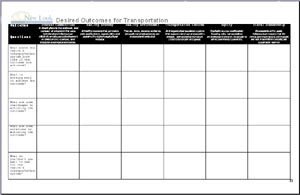Metro has committed to make the next update to the Regional Transportation Plan “outcomes driven”. As part of this process, the Metro Council wants to develop a new set of RTP policies to reflect the desired outcomes in the region. To facilitate this, Metro has set up a series of outreach sessions with stakeholder groups to gather input to facilitate the policy development.
I offered to run the exercise here on Portland Transport and the staff agreed to take in the resulting feedback.

|
Now Metro’s exercise is a rather complex grid (a 6 by 5 matrix). We’re going to simplify that by focusing on a subset. We’ll do the first row (outcomes), then subject those outcomes to the questions in the subsequent rows. The outcome areas correspond to major policies in the 2040 plan:
- Vibrant Communities
- Healthy Economy
- Healthy Environment
- Transportation Choices
- Equity
- Fiscal Stewardship
Between now and the beginning the of next year, Metro will be developing the detailed policies for the RTP for each of these areas, and this exercise is part of that process.
I will put up a blog post for each of these six areas, and invite readers to post their vision of the outcomes as comments. To keep the exercise flowing, the rules for these comments will be a little more structured than usual (and I will be a comment Nazi and kill comments that don’t conform to the rules):
– An ‘outcome’ must be reduced to a single ‘bullet’, i.e., a one sentence statement. You may follow that with a single short paragraph providing further explanation if you want.
– If you have multiple outcomes, submit one comment for each.
– If you agree with someone else’s outcome, quote it in your comment (my preference is italics for quoting) and say you agree and elaborate (no more than one paragraph) on why if you want.
– No criticism of other people’s proposed outcomes (you’ll see why in a little while).
– If you have questions or comments about the exercise or rules, comment on this post, not on the topic posts, please.
My expectation is that we will have competing visions (we seem to on most topics!). After we cover all six topic areas, I will try to assemble some representative ‘outcome sets’ that map to the different visions. I may ask folks who have different points of view than mine to help with this. We’ll then subject two or three different outcome sets to the rest of the questions in the exercise.
I consider this to be an experiment in ways to do meaningful citizen input online, so I hope everyone will cooperate.
Watch for the topic area posts, they’ll be coming out one or two per day for the next several days.
Thanks!
4 responses to “An Online Exercise: New Policies for a New RTP”
I think this is an interesting (and useful) exercise. I am not as sure as you are that waiting to discuss posted outcomes until later will improve the results, but I concede the rule will reduce the likelihood that it will deteriorate into a flame war. (I had to abandon, nearly instantly, the one outcome per comment guideline. I just felt it would be sort of foolish to have 6 comments in a row.)
outcome: Individual & business stakeholders take hold of the reins of transportation development and release the state/city/federal Government of its tangled mess and build market relevant transportation that sustains itself instead of feeding on the public trough so extensively.
agh… I’ve inadvertantly created accidental HTML tags.
anyway…
outcome: Provide a vast decrease in taxpayer costs for transportation by reducing the subsidy through better efficiency, better technology usage, better infrastructure designs, better utilization of existing technology and infrastructure, decreased executive/managerial overhead, elimination of non-key/low rider routes, to at least an even 50/50 percentage with the ultimate goal of eliminating subsidies all together.
outcome: Provide a cost expectation (which is an arbritrary and artificial amount at this moment in time) for transit users (car, plane, train, or whatever) that is equal to their actual usage instead of being offset onto higher income earners/taxpayers so that transit utilization accurately reflects the cost on society to ALL citizens.
i.e. – Fee based usage. i.e. ALL prices should increase (Which would actually end up being a decrease for a large part of the population if they got back the transit “taxes” they’ve paid) creating a decrease in unnecessary trips, decreases in congestion, pollution, and other unlikeables about the current transportation situation in the US.